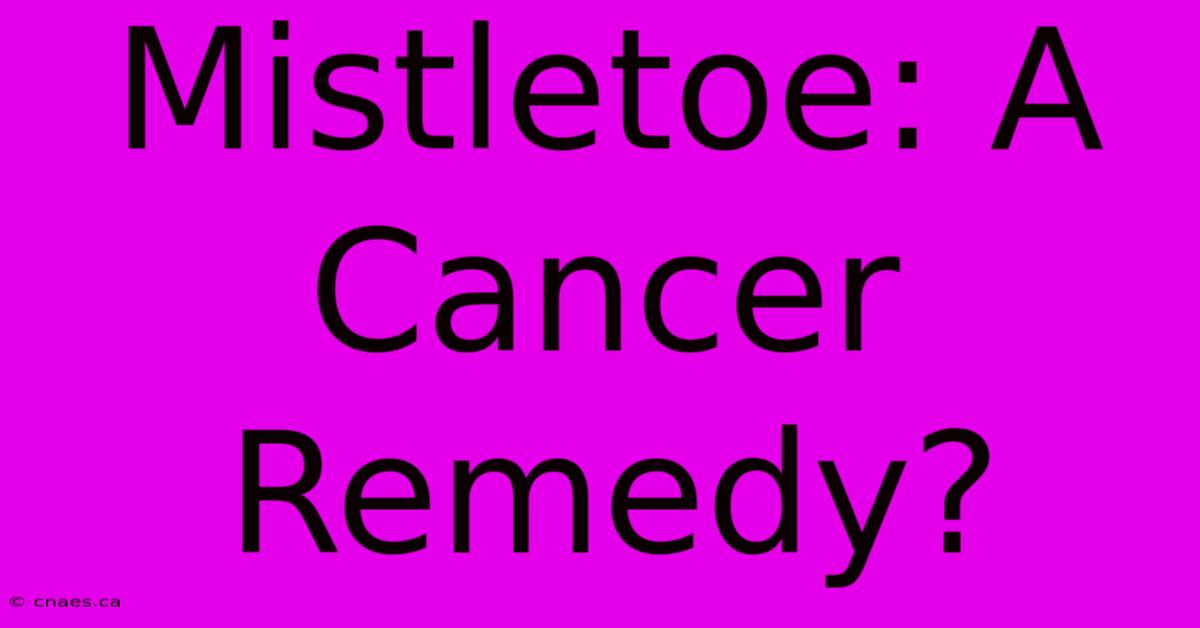Mistletoe: A Cancer Remedy?

Discover more detailed and exciting information on our website. Click the link below to start your adventure: Visit My Website. Don't miss out!
Table of Contents
Mistletoe: A Cancer Remedy? Exploring the Science and Controversy
Mistletoe, with its romantic associations and holiday traditions, has also garnered attention for its purported medicinal properties, particularly in the context of cancer treatment. While it's important to emphasize that mistletoe is not a cure for cancer, its use as a complementary therapy warrants a closer look at the science behind its purported benefits and the ongoing debate surrounding its efficacy.
Understanding Mistletoe Extracts: Not Your Garden Variety Plant
The mistletoe used in alternative medicine is not the same mistletoe you might find kissing under during the holidays. Specific Viscum album extracts, prepared under strict pharmaceutical conditions, are used. These extracts are different from the berries and leaves found in nature, and their preparation is crucial to potential efficacy and safety.
How Mistletoe Extracts are Used
Mistletoe extracts are typically administered through injections, often under the supervision of a qualified healthcare professional. The exact method and dosage depend on the specific extract used, the type of cancer, and the patient's overall health.
The Claims: What Does the Research Say?
Many proponents claim that mistletoe extracts possess several benefits for cancer patients, including:
-
Improved Quality of Life: Some studies suggest that mistletoe injections might improve overall well-being, reduce fatigue, and lessen some side effects associated with conventional cancer treatments. It's crucial to note that these improvements are often subjective and may vary significantly among individuals.
-
Stimulation of the Immune System: A central claim revolves around mistletoe's ability to bolster the immune system, potentially helping the body fight cancer cells more effectively. While some research hints at this effect, more robust studies are needed to confirm its impact in a clinical setting.
-
Direct Anti-Cancer Effects: Some studies have shown that mistletoe extracts might have direct anti-cancer effects in vitro (in a lab setting), but translating these findings to clinical efficacy in humans is complex and often inconclusive.
The Controversy: Lack of Definitive Evidence
Despite anecdotal evidence and some promising pre-clinical studies, the scientific community remains largely divided on the effectiveness of mistletoe as a cancer treatment. Crucially, there's a lack of high-quality, large-scale clinical trials demonstrating a significant survival benefit for cancer patients using mistletoe extracts.
Important Considerations
-
Not a Substitute for Conventional Treatment: Mistletoe extracts should never be used as a replacement for established cancer treatments such as chemotherapy, radiation, or surgery. They should only be considered as a complementary therapy, used in conjunction with, and under the guidance of, oncologists.
-
Potential Side Effects: Mistletoe extracts can cause side effects, including allergic reactions, flu-like symptoms, and inflammation at the injection site.
-
Regulation and Quality Control: The regulation and quality control of mistletoe extracts vary significantly across different countries and manufacturers. This poses a potential safety risk for patients.
Conclusion: Proceed with Caution and Consult Your Doctor
The use of mistletoe extracts for cancer treatment remains a subject of ongoing research and debate. While some individuals may experience improved quality of life when using it as a complementary therapy, it's essential to consult with your oncologist before considering mistletoe. They can assess your individual situation and help you make informed decisions about your treatment plan. Never substitute mistletoe for proven cancer treatments, and always prioritize evidence-based approaches alongside any complementary therapies. More rigorous scientific studies are needed to fully understand the potential benefits and risks associated with mistletoe extracts in cancer treatment.

Thank you for visiting our website wich cover about Mistletoe: A Cancer Remedy?. We hope the information provided has been useful to you. Feel free to contact us if you have any questions or need further assistance. See you next time and dont miss to bookmark.
Also read the following articles
| Article Title | Date |
|---|---|
| Hediger Swiss Olympian Dies In Avalanche | Dec 25, 2024 |
| Home Alone Streaming New Installment | Dec 25, 2024 |
| Kay Bin Zii Jias New Badminton Coach | Dec 25, 2024 |
| Prepared For Victorias Strong Winds | Dec 25, 2024 |
| Zelda Reimagined By Sonic Team | Dec 25, 2024 |
